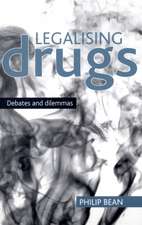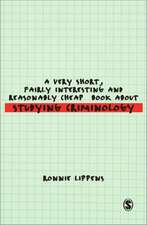Geometries of Crime: How Young People Perceive Crime and Justice
Autor Avi Brismanen Limba Engleză Hardback – 11 aug 2016
Preț: 641.20 lei
Preț vechi: 754.36 lei
-15% Nou
Puncte Express: 962
Preț estimativ în valută:
122.70€ • 126.77$ • 102.07£
122.70€ • 126.77$ • 102.07£
Carte tipărită la comandă
Livrare economică 19 martie-02 aprilie
Preluare comenzi: 021 569.72.76
Specificații
ISBN-13: 9781137546197
ISBN-10: 1137546190
Pagini: 208
Ilustrații: XIII, 249 p. 13 illus., 5 illus. in color.
Dimensiuni: 148 x 210 x 19 mm
Greutate: 0.44 kg
Ediția:1st ed. 2016
Editura: Palgrave Macmillan UK
Colecția Palgrave Macmillan
Locul publicării:London, United Kingdom
ISBN-10: 1137546190
Pagini: 208
Ilustrații: XIII, 249 p. 13 illus., 5 illus. in color.
Dimensiuni: 148 x 210 x 19 mm
Greutate: 0.44 kg
Ediția:1st ed. 2016
Editura: Palgrave Macmillan UK
Colecția Palgrave Macmillan
Locul publicării:London, United Kingdom
Cuprins
Chapter 1. The Corners of Crime: An Introduction.- Chapter 2. Pyramids, Squares and Prisms: Severity of Harm, Public Awareness and Perceptions of Severity of Harm, Power Relations and Society's Response.- Chapter 3. Red Hook, The RHCJC and Youth Courts.- Chapter 4. Red Hook Youth Court Hearings and Youth Perceptions of Criminal Severity, Justice, Law, Punishment and Remorse.- Chapter 5. Beyond Shape: An Open Conclusion.
Recenzii
“Brisman’s work—like his title—is a complex and layered geometry of claims that in fact emerge out of his deeply reflective concerns with the very project he initiated. His work is to be read carefully, as it is in fact a very layered story of one scholar’s own process of grappling with what at first attracted him as an innovation that was a step forward in terms of dismantling traditional criminal justice structures … .” (Alexandra Cox, Critical Criminology, Vol. 25 (1), March, 2017)
“Avi Brisman’s Geometries of Crime: How Young People Perceive Crime challenges the theoretical analyses of criminologists who define crime using geometric models. … One of the strengths of this book is Brisman’s focus on the criminal justice system as perceived by RHCJC youth. … Geometries of Crime provides critical insight for academics and criminal justice practitioners considering the relevance of youths’ perceptions within the criminal justice system.” (James Gacek, The Annual Review of Interdisciplinary Justice Research, Vol. 6, 2017)Notă biografică
Avi Brisman is Associate Professor in the School of Justice Studies, Eastern Kentucky University, USA. He is co-editor of the Routledge International Handbook of Green Criminology (2013), co-editor of Environmental Crime and Social Conflict: Contemporary and Emerging Issues (2015), and co-author of Green Cultural Criminology: Constructions of Environmental Harm, Consumerism, and Resistance to Ecocide (2014).
Textul de pe ultima copertă
This book explores how young people perceive the severity of crime and delinquency. It particularly addresses whom or what they consider to be the victims of crime and delinquency, how they analyze and assess appropriate responses by the criminal justice system, as well as their place within it. The book proposes tools for developing a more elaborate and robust understanding of what constitutes crime, identifying those affected by it, and what is deemed adequate or appropriate punishment. In so doing, it offers thick description of young peoples' conceptions of and experiences with crime, delinquency, justice and law, and uses this description to interrogate the role of the state in influencing - indeed, shaping - these perceptions.














